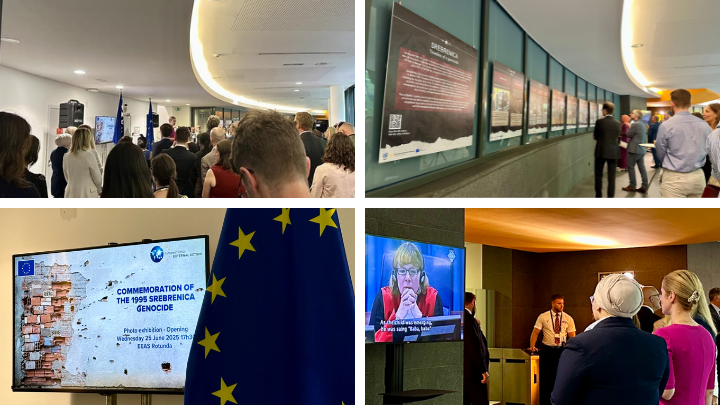Exhibitions “Memento: Fragments of the Srebrenica Genocide” and “Srebrenica: Timeline of a Genocide” open at EEAS Headquarters in Brussels

To mark the upcoming 30th anniversary of the 1995 genocide in Srebrenica, the European External Action Service (EEAS) opened today two exhibitions at its headquarters in Brussels: Memento: Fragments of the Srebrenica Genocide, produced by the Post-Conflict Research Center, and Srebrenica: Timeline of a Genocide, produced by the Mechanism Information Programme for Affected Communities (MIP).
The exhibitions aim to honour the victims and survivors of the genocide while reaffirming the importance of remembrance, truth, and justice. Memento presents a collection of survivor portraits and personal belongings recovered from mass graves—each accompanied by a testimony from its donor—offering an intimate, human view of one of the darkest chapters in recent European history.
The MIP’s exhibition, Srebrenica: Timeline of a Genocide, presents the judicial narrative of the genocide, explaining how it was planned and carried out. It draws on the testimonies of survivors as well as insiders from the Bosnian Serb Army. Grounded in judicially established facts from the International Criminal Tribunal for the former Yugoslavia (ICTY) and the International Residual Mechanism for Criminal Tribunals (IRMCT), the exhibition highlights the legal findings that underpin our understanding of these events.
The exhibitions were officially opened by Ms. Kaja Kallas, EU High Representative for Foreign Affairs and Security Policy and Vice-President of the European Commission.
MIP's participation in this event is part of its ongoing efforts to support projects and events implemented by civil society organizations active in the field of transitional justice in the former Yugoslavia.
The aim of the MIP is to improve the knowledge and understanding of citizens and communities in the countries of the former Yugoslavia about the crimes committed during the conflicts of the 1990s, based on the jurisprudence of the ICTY and the Mechanism.
The MIP is funded by the European Union.